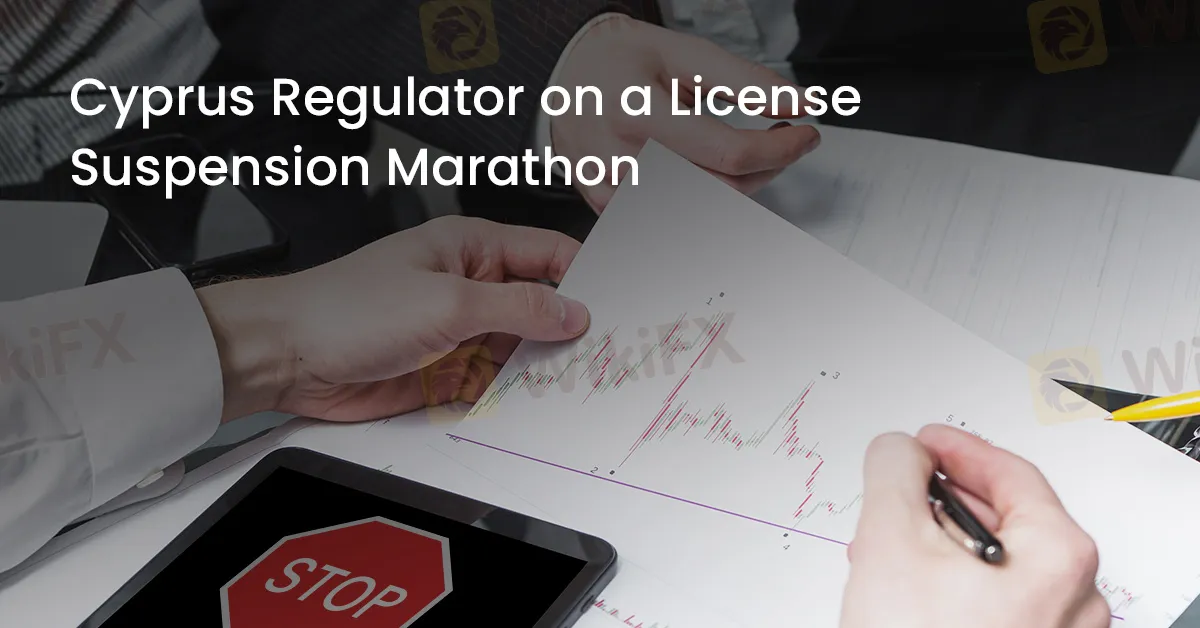简体中文
繁體中文
English
Pусский
日本語
ภาษาไทย
Tiếng Việt
Bahasa Indonesia
Español
हिन्दी
Filippiiniläinen
Français
Deutsch
Português
Türkçe
한국어
العربية
Cyprus Regulator on a License Suspension Marathon
Abstract:Recently, the Cyprus Securities and Exchange Commission (CySEC) issued statements regarding the suspension and revocation of licenses for three investment firms in accordance with The Investment Services and Activities and Regulated Markets Law.

The Cyprus Securities and Exchange Commission (CySEC) recently issued statements concerning the suspension and revocation of licenses for three investment firms in accordance with The Investment Services and Activities and Regulated Markets Law. CySEC has opted to extend the suspension of FTX EU Ltd's license until September 30, 2024. FTX EU Ltd's license has been under suspension since November 11, 2022, with this extension marking the fourth instance. Operating as the European arm of the cryptocurrency exchange FTX, FTX EU Ltd is licensed under number 273/15. Additionally, Sam Bankman-Fried, the founder and former CEO of FTX, has been sentenced to 25 years in prison for fraud and associated charges.
Furthermore, CySEC has revoked the Cyprus license of forex broker AAATrade, a decision reached during a meeting held on March 4 of this year. Previously holding CIF license number 244/14, AAATrade's regulatory status in Cyprus is now listed as “Voluntary Renunciation.”
Additionally, CySEC has determined to annul the license of Stockstech Investments Ltd (License No. 419/22) on April 8, conforming to The Investment Services and Activities and Regulated Markets Law. Currently, the regulatory status of Stockstech Investments Ltd on CySEC's official page is recorded as “Voluntary Renunciation.” Moreover, its authorized websites, www.stocks.com and www.stockstech.com, are no longer accessible.

Financial regulators have the authority to remove the license of brokers under various circumstances, all of which aim to protect investors and maintain the integrity of the financial markets. One common reason for license removal is a breach of regulatory compliance. Brokers are required to adhere to strict rules and regulations set forth by regulatory bodies to ensure fair and transparent trading practices. If a broker fails to comply with these regulations, such as by engaging in fraudulent activities, misusing client funds, or providing misleading information, the regulator may revoke their license. Another circumstance that may lead to license removal is financial instability or insolvency. Financial regulators monitor the financial health of brokerage firms to safeguard investors' funds. If a broker becomes financially unstable or unable to meet its financial obligations, such as fulfilling client withdrawals or maintaining adequate capital reserves, the regulator may intervene to protect investors' interests by revoking the broker's license. Additionally, a broker's license may be revoked due to unethical business practices or misconduct. This could include cases of market manipulation, insider trading, or other forms of misconduct that undermine the integrity of the financial markets. Regulators take such matters seriously and may take decisive action to remove the license of brokers involved in unethical behaviour. Overall, financial regulators remove the license of brokers to maintain market integrity, protect investors, and uphold the principles of fairness and transparency in the financial industry. By enforcing strict regulatory standards and holding brokers accountable for their actions, regulators play a crucial role in ensuring the stability and trustworthiness of the financial markets.
WikiFX is a global forex regulatory query platform that hosts verified information on over 50,000 brokers worldwide. Stay up-to-date with the latest broker-related news by downloading the free WikiFX mobile application from Google Play or the App Store.

Disclaimer:
The views in this article only represent the author's personal views, and do not constitute investment advice on this platform. This platform does not guarantee the accuracy, completeness and timeliness of the information in the article, and will not be liable for any loss caused by the use of or reliance on the information in the article.
Read more

XTB Hack 2025: Major Security Breach Exposes Client Accounts
XTB suffers a major hack in 2025, with hackers draining client accounts and sparking urgent security upgrades. Learn how the breach unfolded and what’s next.

XTB Hack 2025: Major Security Breach Exposes Client Accounts
XTB suffers a major hack in 2025, with hackers draining client accounts and sparking urgent security upgrades. Learn how the breach unfolded and what’s next.

Want to Succeed in Forex? Start with the Right Trading System
If you want to trade currencies and make money in the long run, you need a good forex trading system. Many new traders enter the market without a clear plan. Some rely on luck or tips from others. But trading without a system often leads to losses.

Risk Involved with Cabana Capital – Every Trader Should Know
Cabana Capital has changed its name and logo, basically everything about its identity. This seems a bit suspicious, and it's something you should definitely be concerned about. In this article, you’ll learn about the red flags that every trader needs to watch out for.
WikiFX Broker
Latest News
Manual vs. Automated Forex Trading: Which One Should You Choose?
Scammed by a Click: He Lost RM300,000 in a Month
Revealing Factors That Help Determine the Gold Price in India
Why Regulatory Compliance Is the Secret Ingredient to Trustworthy Forex Brokers
How Are Trade Policies Affecting the Aluminum Market?
US Government Interest Grows in Victory Metals’ Rare Earths Supply
RM71,000 Lost in a Share Scheme That Never Existed
Pentagon to become largest shareholder in rare earth miner MP Materials; shares surge 40%
Delta shares jump 13% after airline reinstates 2025 profit outlook as CEO says bookings stabilized
Delta shares jump 12% after airline reinstates 2025 profit outlook as CEO says bookings stabilized
Currency Calculator


